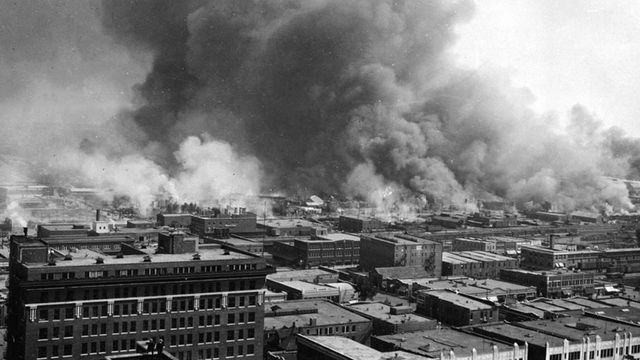
The 1921 Tulsa Race Massacre: A Historical Context
Copresented with the Department of African American Studies at UCLA
Professor Brenda E. Stevenson moderates an online conversation with Karlos K. Hill and Hannibal Johnson, both authors and experts on the 1921 Tulsa Race Massacre, in which a white mob assaulted residents, looted, and destroyed their homes, churches, schools, and businesses in the predominantly Black neighborhood and business district of Greenwood in Tulsa, Oklahoma. The panel discusses the history of Black migration to Oklahoma, the Jim Crow realities of the early 20th century, the facts surrounding the Tulsa massacre, and the immediate aftermath in which hundreds of Black Americans were dead, homeless, or imprisoned, their families and financial lives devastated.
An associate professor and chair of the Clara Luper Department of African and African-American Studies at the University of Oklahoma, Hill is the founder and chair of the 1921 Tulsa Race Massacre Commission. His most recent book is The 1921 Tulsa Race Massacre: A Photographic History. An attorney, author, and highly regarded public historian, Johnson is the author of Black Wall Street 100: An American City Grapples with its Historical Racial Trauma.
Buy Karlos K. Hill and Hannibal Johnson's books in the Hammer Store online:
- The 1921 Tulsa Race Massacre: A Photographic History by Karlos K. Hill
- Black Wall Street 100: An American City Grapples with its Historical Racial Trauma by Hannibal Johnson
Hammer Channel includes 1,000+ talks, performances, artist profiles, and more. Search, clip, and share topics ranging from politics and activism to art, film, and literature.
ATTENDING THIS PROGRAM?
Join live: The program will play live on this page. RSVP to receive an email reminder on the day of the program.
Watch later: This program will be recorded. The recording will be available soon after on Hammer Channel, our video platform where you can watch 1000+ talks, performances, artist profiles, and more.
Need help?: Contact our visitor experience team at info@hammer.ucla.edu or 310-443-7000.
Give back: This program is free. The Hammer relies on your support in order to present its programs and exhibitions. Please consider making a contribution.





